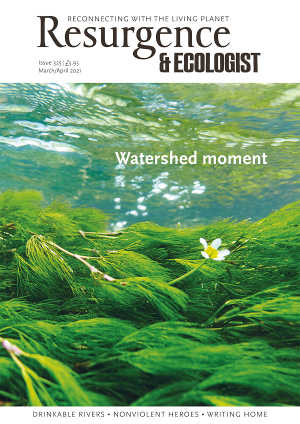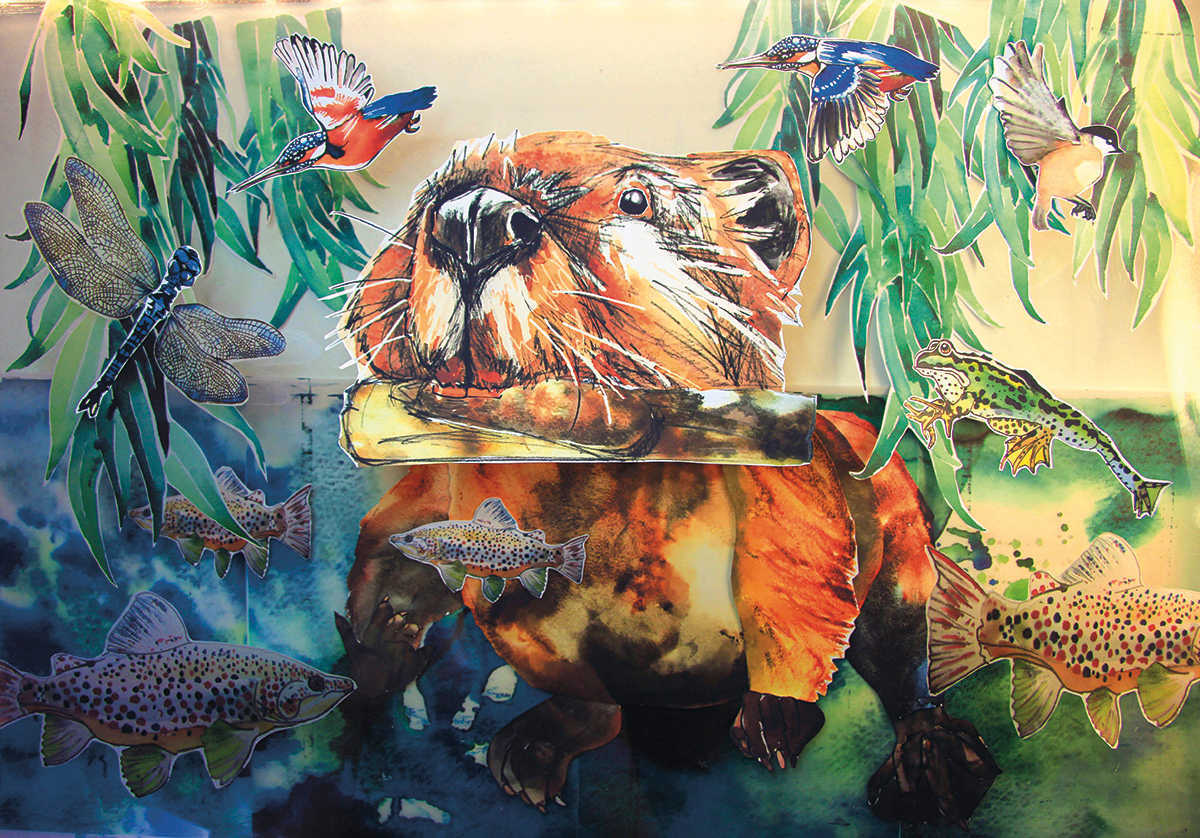The road to Derek Gow’s farm is muddy and wet and often indistinguishable from the ditches at either side. Much of the track is flanked with ‘improved’ grassland, ground dominated by grass species that outcompete native flowers and fine grasses. This dearth of biodiversity is typical of the landscape here in West Devon, but Gow’s 300-acre patch promises something quite different. The farm, home to his wildlife consultancy business, breeds wild animals for reintroduction: mostly water voles, but he also houses wild cats and storks. Since he bought it in 2006, much has already been transformed by some of his most storied residents: beavers.
Beavers, Europe’s largest rodent, are a keystone species, transforming the landscape around them and creating habitats for numerous other creatures. Their dams, built in shallow rivers and waterways, provide nurseries for fish and other water-dwelling critters, and the clearings they create by cutting down trees for food and material for their dams and lodges give space for wild flowers and pollinators. Riparian trees like willow, black poplar and rowan have evolved to accommodate the habits of these toothy herbivores.
The animals have been doing this for the last 40 million years, and in the Anthropocene their presence on our waterways has other benefits too. By slowing the flow of water with their dams, beavers can not only reduce the risk of flooding downstream, but also help the land retain water in times of drought. Added to this, the dams can help reduce pollution by trapping agricultural run-off and preventing it from flowing downstream. As if that weren’t enough, wetlands like the ones beavers create can store up to five times more carbon than dry areas. Britain is one of the most Nature-depleted countries in the world, ranked 189th out of 218. So why aren’t there legions of beavers across this island helping us sort out our ecological crisis?
The answer is that there might have been if we hadn’t killed them all. Hunted to extinction for their fur, scent glands and meat, the last beavers in Britain disappeared in the 1500s. Thanks to people like Derek Gow (or ‘Beaver Man’, as he is described by Alastair Driver, director of Rewilding Britain) they are coming back.
The first official reintroduction of beavers in Britain took place in Kent in 2002, and today there are an estimated 550 beavers in the UK – not many compared to Germany (35,000) and Poland (125,000), but the situation is hopeful. “The idea of having beavers in the landscape [in Britain] is light years away from where it was a quarter of a century ago,” Gow tells me.
As a Nature conservationist, Gow has spent much of his career arguing the case for the restoration of beavers. In his book Bringing Back the Beaver (Chelsea Green, 2020), he describes battling senseless levels of bureaucracy, misinformation and agonising caution, in the crusade led by him and other specialists to enable the return of these ecosystem engineers. As well as his keen powers of observation and belligerent wit, he pulls no punches in communicating the urgency of our situation.
A large part of the problem is bringing beavers back into a micromanaged landscape reserved entirely for industrial farming. As well as breeding beavers at his farm, Gow translocates others from Tayside, Scotland, where conflict with farmers has led to culling. Beavers were given European Protected Species status in May 2019, meaning they could only be shot under licence. However, out of an estimated 450 beavers in the Tay catchment, 87 were officially culled in Tayside in 2019, a move that prompted widespread condemnation in the media.
A recent opinion poll commissioned by The Scottish Rewilding Alliance showed that 66% of Scots thought beavers should be translocated instead of being killed when they needed managing. Only 5% disagreed. This public support bodes well for the beavers, Gow says, but changing the attitudes of many farmers is going to require political will. “A much wider part of society is saying: we want Nature, we want to live in a landscape where other things live too. We do not want to live in a landscape where everything dies and we pay for it.”
Gow blames farming subsidies for encouraging many farmers to seek to preserve the post-world-war-two farming landscape. Up until Brexit, the UK government paid farmers nearly £3 billion as part of the Common Agricultural Policy. I ask Gow if there is any hope post Brexit that farmers could be paid to have beavers on their land. “It’s certainly something that’s been talked about,” he says. “There’s a strong hope that, with the 25-year environment plan, farmers are going to get paid to actually produce Nature. Now, quite how that’s going to translate we don’t know.”
The tide for restoration has emphatically turned, Gow says. Following the successful five-year beaver trial on the river Otter in East Devon, the government promised a consultation on the management of beavers in the wild. Gow is optimistic about the results. “At the moment we’re treading water, putting licence applications into Natural England for small projects, enclosed projects or single isolated river systems. But when this decision is reached we’ll move to bigger and bigger projects.”
To view the animation, Beavers, Nature's Ecosystem Engineers, visit www.lodge.beavertrust.org/media-hub. Derek Gow will be speaking at a Resurgence event in Spring 2021. For more information visit resurgenceevents.org/events








